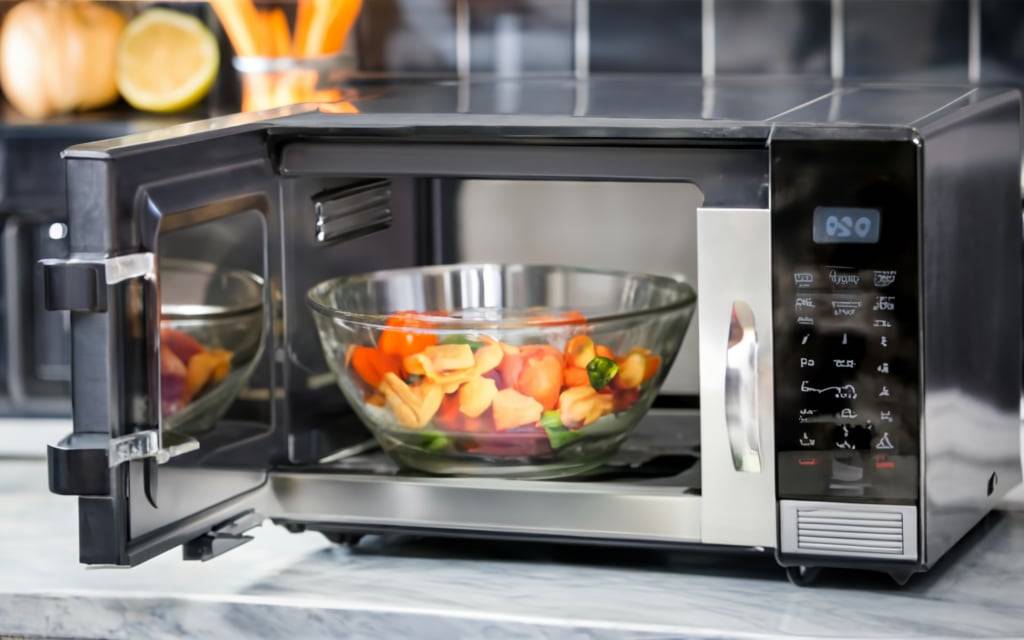Microwave Not Warming Food? How to Fix It Leave a comment
We’ve all been there: you pop your leftovers into the microwave, hit the start button, and… nothing happens. Or maybe the microwave is running, but your food stays cold. It’s frustrating, isn’t it? If you’re dealing with a microwave not warming food, you’re in the right place. Let’s dive into why this happens and how you can get your microwave back to its trusty self.
Why Is My Microwave Not Warming Food?

Common Causes
1. Door Switch Failure
If the door switch isn’t engaging properly, your microwave won’t start cooking. This switch is crucial because it signals to the microwave that the door is closed and safe to operate.
2. Magnetron Issues
The magnetron is the part of your microwave that generates the microwaves needed to heat your food. If it’s malfunctioning, your microwave won’t produce any heat.
3. Faulty Capacitor
The capacitor stores and releases electrical energy. If it fails, the microwave might not work properly. Capacitors can be dangerous to handle due to high voltage, so proceed with caution or consult a professional.
4. Power Supply Problems
Sometimes the issue is as simple as a tripped circuit breaker or a blown fuse. Check these basics first before diving into more complex repairs.
Signs to Watch For
- Microwave turns on, but food stays cold: Indicates a problem with the heating components.
- Strange noises or sparks: Often a sign of internal issues that need professional attention.
- Display issues or power surges: Can signal electrical problems or a faulty connection.
Quick Fixes for When Your Microwave Isn’t Heating
Check the Power Supply
- Ensure it’s plugged in: This might sound obvious, but sometimes the plug can come loose.
- Check for a tripped breaker or blown fuse: Inspect your circuit breaker box and replace any blown fuses.
Inspect the Door Switch
- Test the latch: Make sure the door is closing and latching properly. If not, the switch may need replacement.
- Listen for clicks: When closing the door, you should hear a click. If you don’t, the switch might be faulty.
Test the Magnetron
What it does: The magnetron generates the microwaves that cook your food. If it’s faulty, the microwave won’t heat.
Testing it: Use a multimeter to check if the magnetron is functioning. If you’re not comfortable with this, it’s best to call a professional.
Check the Capacitor
Danger warning: Capacitors hold high voltage even after being unplugged. Handle with care.
Visual inspection: Look for signs of bulging or leaking, which indicate a problem.
Call in the Pros
If you’ve tried the above steps and your microwave still isn’t working, it might be time to consult a professional. Repairs can be costly, so weigh the cost of repair versus replacement.
List: Signs You Need Professional Help
- Smell of burning plastic or wires.
- Smoke or sparks.
- Consistently tripping breakers.
Preventing Your Microwave from Future Failures
Regular Maintenance Tips
- Clean the microwave: Wipe down the interior regularly to prevent food buildup, which can cause damage.
- Avoid slamming the door: This can wear out the door switch over time.
- Don’t run it empty: Operating a microwave without anything inside can damage the magnetron.
Energy Efficiency Tips
- Unplug when not in use: This can save on energy bills and reduce wear and tear.
- Use a microwave cover: Helps cook food evenly and keeps the interior cleaner.
When to Replace Your Microwave
Lifespan: Most microwaves last about 7-10 years. If yours is nearing the end of its life, it might be time to consider a replacement.
Signs it’s time to buy new:
- Loud noises during operation.
- Uneven heating or longer cooking times.
- Frequent breakdowns.
Top Tips for Microwave Longevity
- Keep the interior clean.
- Avoid using metal containers.
- Test and replace the power cord if it shows wear.
FAQs About Microwaves Not Warming Food
1. Why does my microwave turn on but not heat?
This could be due to a faulty magnetron, door switch, or power supply issue. We’ve covered these potential problems in detail above.
2. Is it worth repairing a microwave?
It depends on the age of your microwave and the cost of repair. If the repair costs more than half the price of a new microwave, it might be more cost-effective to replace it.
3. Can I fix my microwave myself?
Simple issues like a blown fuse or loose power cord might be DIY fixes. However, anything involving the magnetron or capacitor should be handled by professionals due to the risk of electric shock.
Conclusion
If you’re dealing with a microwave not warming food, don’t let it spoil your day. By understanding the common causes and quick fixes, you can address the issue promptly.
Whether you choose to troubleshoot on your own or seek professional help, taking action now will get you back to enjoying your microwave’s convenience in no time.
Don’t let a malfunctioning microwave stand in your way.
Act on these tips, and you’ll be back to enjoying warm meals in no time.
Read also:
